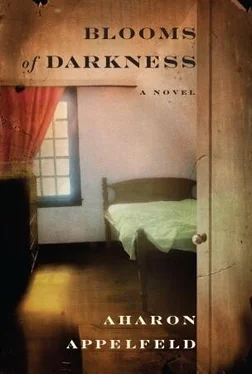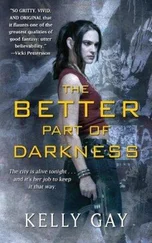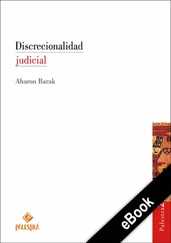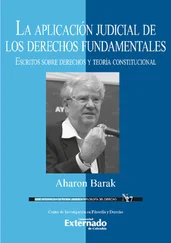“Sandwiches, too?”
“Of course.”
Hunger torments him, and he waits tensely for Nasha’s arrival.
Toward evening the closet door opens, and Victoria stands in the doorway. “What are you doing?” she asks, as though he was again caught doing something naughty.
“Nothing,” he says, and stands up.
“Nasha drowned in the river, and you sit there as though everything is coming to you.”
“I didn’t know,” he lies.
“Nasha drowned, and I don’t know who they’re going to put in her room. Not everyone will want to watch over you. It’s risky to watch over you. You’re endangering all of us. Do you understand?”
“Yes.”
“If there are more searches, you’ll have to get out of here. We can’t keep you anymore.”
“Where will I go?”
“To the forest. There are Jews in the forest.”
“And who will watch over Mariana’s clothes?”
“That’s no concern of yours.”
Later, Victoria brings him soup and meatballs and leaves. Hugo sinks completely into the tasty food. The terrors and fears that tortured him all day long depart. He recovers and says to himself, If I have to run away, I’ll run away. Now it’s summer, and the nights are warm. There’s fruit in the forest. The farmers won’t identify me. I’m blond. I’m wearing a cross on my chest, and I speak fluent Ukrainian. In the forest I’ll find Mariana, and we’ll live together in nature, far from people and their scheming .
The following days are tense: the women in The Residence quarrel and weep bitter tears. Nasha’s death continues to shake their hearts.
“The evil fish ate her flesh,” a voice of despair is heard saying in the corridor. Victoria’s opinion is different: “Now Nasha is in heaven, and good angels escort her from place to place. There’s nothing to worry about. She’s in good shape now. If only we were, too.” But she speaks to Hugo in a different tone of voice: “You have to run away. If you don’t run away, we’ll chase you away.”
“I’m waiting for Mariana.”
“There’s nothing for you to wait for. She won’t come. You have to go to the forest. There are still Jews there.”
Hugo disdains the fear that has gripped him, but it is stronger than he is. At night he dreams he is with his parents on the express train that makes its way to the Carpathians. They are covered with snow. The train stops, as always, at the station that everybody calls “The Peak.” Hugo clamps his skis onto his boots and skis straight from the platform. The skiing is smooth, and he feels his whole body soaring. His father, who is skiing behind him, calls out, “Hugo, you’re skiing wonderfully. You’ve improved a lot since the last time we were here. Where did you learn? That didn’t happen by itself.” Encouraged by his father’s words, Hugo increases his speed and soars over the snow. He says in a loud voice, “I’ve overcome fear. Now I’m not afraid anymore.”
The next day Victoria speaks to Hugo sternly. “They’re searching for Jews from house to house. You’re endangering us all. You have a few more hours to get your knapsack ready, crawl out through the hole, and disappear. If you don’t, the guard will deliver you to the police.”
“And where will I go?” His voice trembles.
“I’ve already told you — to the forest. There are Jews in the forest. Don’t be a coward. Take a risk and live. Whoever doesn’t take a risk — fear kills him.”
“I’ll go tonight,” Hugo says.
“If I open the closet tomorrow morning and find you, your blood is on your own head.”
That is the verdict, and he pictures the guard dragging him.
In his heart Hugo decides that he’ll leave the suitcase, the Jules Verne and Karl May books, and the arithmetic and geometry books. He’ll take some warm clothes, the notebook, and the Bible. If God wants me to come back here, I’ll find everything in its place, but if He wants me to stay in the forest, there’s nothing to be done . The words roll about in his head. Later he realizes that this is Mariana’s way of speaking, and he has adopted it.
For some reason Sofia, his parents’ housekeeper, appears before his eyes. She stood in palpable contradiction to all the ideas that were prevalent in his house. Her country manners, her religiosity, her personal beliefs, and her arbitrariness bespoke a confidence in herself and her way of life. Doubts never clouded her spirit. More than once she had said, “The Jews are too thoughtful. I never saw a Jew give his anger free reign. Why don’t Jews get angry?” Often, when she came back from church, Hugo would hear her say, “Why don’t you go to a house of worship? I come back from church a new woman. The prayers, the music, the sermon bind me to God and His Messiah. Don’t you long for God?”
“We long,” his father would answer, half seriously, half facetiously.
“If so, why do you stay at home on the Sabbath?”
“God is everywhere, at home, too. Isn’t that what they say?” His father tried to answer cleverly.
Hearing that, Sofia would wave her arm as if to say, Those are just excuses . Sometimes she would add, “The Jews are a strange nation. I’ll never understand them.”
Sofia was full of vitality, and his parents liked her. They used to buy her a present for every holiday, or they’d give her some money so she could buy something for herself. About a month before the German invasion, she had gone back to her village. Hugo’s mother supplied her with clothing and severance pay. Sofia cried like a child and asked, “Why am I leaving you? You’re better to me than my parents and my sisters.”
“You can stay,” his mother immediately responded.
“I swore to my parents that I’d come back. I can’t violate that oath.”
All three of them accompanied Sofia to the railroad station, and they didn’t leave until she was seated next to the window.
Hugo rouses himself from his daydream. It’s two in the morning. The lair called “the closet,” where he has been imprisoned for about a year, now seems to him like a refuge that not only protected him but also nourished him with enchanted images. Every time he crawls down the opening near the toilet and goes outside, the darkness seems thick and full of hostility.
Time is quickly passing, but Hugo doesn’t hurry. Mariana’s clothes, filling the closet and covering its walls, are precious to him now, as though they belong to his inner world. If he is going to die, better to die here and not outside, he says to himself, without properly considering what he’s talking about.
At four o’clock Hugo shoves the knapsack through the opening and crawls down after it. Darkness cushions the bottom of the fence and the tree trunks. Pale patches of light are already scattered in the sky. Hugo could easily climb the fence and reach the field, but his feet refuse to obey. He stands in place and doesn’t move. Finally he goes into the woodshed and curls up in a corner.
Hugo sits and awaits the guard’s footsteps. Once he saw him through the cracks; a tall, broad-shouldered man, he was reviling one of the women: “You’re just what you are. Clear out and go to your room.”
“I won’t go. I don’t take orders from you,” she shouted at him.
“If I hear one more word, I’ll crush you,” he said, and he demonstrated with his fingers.
Hugo feels sorry for himself, because he’s going to be crushed in the guard’s powerful hands and he’ll never see his parents again. But to get up and jump over the fence into the thick darkness — his legs refuse to do it. He takes the notebook out of the knapsack and writes:
Dear Papa and Mama ,
Читать дальше












